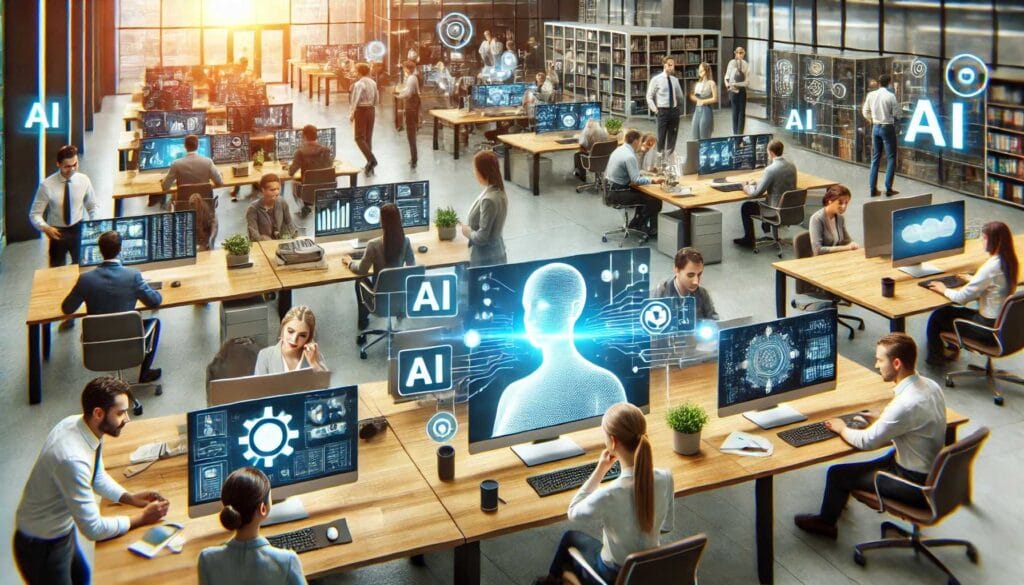The Impact of AI on Job Creation

Artificial Intelligence (AI) has significantly transformed industries and reshaped the global job market. While some fear that AI will lead to widespread job losses, others argue that it has the potential to create new opportunities and improve the quality of work in many sectors. In this article, we explore the different ways AI is affecting job creation and the future of employment.
1. Automation of Repetitive Tasks
One of the most significant impacts of AI is the automation of repetitive and mundane tasks. In sectors such as manufacturing, customer service, and logistics, AI technologies like robotics and machine learning algorithms can take over tasks such as data entry, inventory management, and assembly line operations. While this may reduce the need for certain low-skilled jobs, it allows workers to focus on more creative, strategic, and problem-solving tasks. This shift leads to the creation of higher-level positions that require more advanced skills.
2. Creation of New Job Roles
AI is not only eliminating jobs but also creating new ones. As AI technologies evolve, the demand for specialized roles increases. New job titles such as AI specialists, data scientists, machine learning engineers, and AI ethics consultants have emerged. These roles are essential for developing, managing, and maintaining AI systems, as well as ensuring that AI is used ethically and responsibly. This creates a need for workers with advanced technical skills, which in turn drives innovation and growth in the tech industry.
3. Enhancement of Existing Jobs
AI is also enhancing existing jobs by providing tools and technologies that help workers perform their tasks more efficiently. For example, in healthcare, AI-powered diagnostic tools assist doctors in identifying diseases and creating personalized treatment plans, allowing them to provide better care to patients. Similarly, in education, AI-based learning platforms can help teachers create more personalized learning experiences for students. By automating routine tasks, AI gives workers more time to focus on their core responsibilities and increases productivity.
4. Improving Workforce Diversity
AI can also contribute to improving workforce diversity. By using algorithms to analyze resumes and applications, companies can reduce human bias in hiring decisions. AI can ensure that qualified candidates from diverse backgrounds are considered for job roles, which can help address issues of inequality in the workplace. Furthermore, AI can be used to design training programs that are more inclusive, allowing individuals from various demographics to gain the skills needed to enter the workforce.
5. Economic Growth and Innovation
The rise of AI has the potential to boost economic growth by increasing productivity and creating new industries. As AI is integrated into various sectors, companies can streamline their operations, reduce costs, and develop new products and services. This, in turn, creates a ripple effect, leading to job creation in fields such as research and development, marketing, and sales. Additionally, AI-driven innovation fosters the creation of entirely new markets and industries that did not exist before, providing new opportunities for employment.
6. Challenges and the Need for Reskilling
Despite its potential to create jobs, the widespread adoption of AI presents challenges. Workers in industries that are most vulnerable to automation may face job displacement. For example, retail workers, truck drivers, and factory employees may see their roles replaced by AI technologies. To mitigate this impact, there is a growing emphasis on reskilling and upskilling the workforce. Governments, educational institutions, and businesses must collaborate to offer training programs that equip workers with the skills needed for emerging AI-driven roles.
Conclusion
The impact of AI on job creation is multifaceted. While automation may eliminate some jobs, AI also has the potential to create new roles, enhance existing ones, and drive economic growth. The key to harnessing the benefits of AI lies in preparing the workforce through education and reskilling initiatives. By doing so, we can ensure that AI not only improves efficiency but also contributes to a more prosperous and inclusive future for all.
Source : Medium.com




